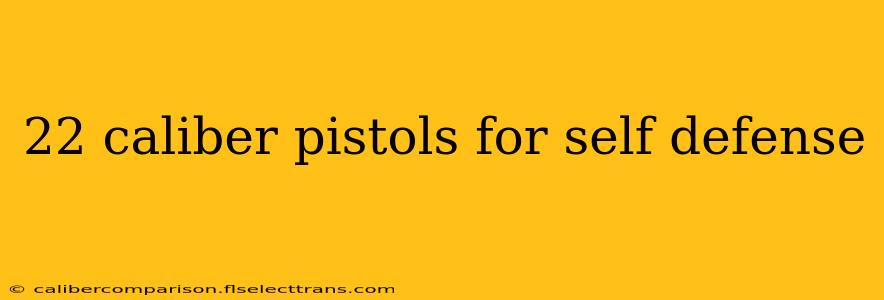Choosing a firearm for self-defense is a deeply personal decision, demanding careful consideration of various factors. While larger calibers often dominate the conversation, the .22 LR pistol deserves a closer look, particularly for specific circumstances and individual preferences. This guide explores the pros and cons of .22 caliber pistols for self-defense, offering insights to help you make an informed choice. Remember, this information is for educational purposes only and should not be considered legal advice. Always check your local laws and regulations regarding firearm ownership and usage.
The .22 LR: A Closer Look at the Caliber
The .22 Long Rifle (.22 LR) is known for its affordability, low recoil, and high capacity magazines. These characteristics make it attractive to new shooters and those seeking a manageable firearm for home defense. However, its smaller size and lower energy transfer compared to larger calibers require a nuanced understanding of its limitations.
Advantages of .22 LR for Self-Defense:
- High Capacity: Many .22 LR pistols offer magazines with significantly higher capacities than larger calibers, meaning more shots before needing a reload. This can be crucial in a self-defense situation.
- Low Recoil: The gentle recoil makes .22 LR pistols exceptionally easy to shoot, even for those with limited experience or physical limitations. This allows for faster follow-up shots.
- Affordability: Ammunition and firearms in .22 LR are generally much cheaper than those in larger calibers, making it a budget-friendly option for regular practice. Practice is crucial for developing proficiency and confidence.
- Quiet Options: Some .22 LR pistols and ammunition are designed for quieter operation, minimizing the noise associated with a defensive firearm discharge.
Disadvantages of .22 LR for Self-Defense:
- Lower Stopping Power: This is the most significant drawback. The smaller bullet and lower velocity result in less stopping power compared to larger calibers. A precise shot placement is critical.
- Penetration: .22 LR rounds may not penetrate sufficiently through barriers like clothing or car doors, making it less effective in certain situations.
- Overpenetration Concerns: Although less of a concern compared to larger calibers, the risk of overpenetration, particularly with certain types of ammunition, still exists.
- Reliability: While many .22 LR pistols are reliable, some can be more sensitive to ammunition type and cleanliness.
Choosing the Right .22 LR Pistol for Self-Defense
If, after careful consideration, you determine a .22 LR pistol is suitable for your self-defense needs, several factors warrant attention:
Factors to Consider:
- Accuracy: Choose a pistol known for its accuracy. Practice is paramount to develop the skill to consistently hit your target.
- Reliability: Select a well-regarded brand with a proven track record of reliability. Read reviews and seek advice from experienced shooters.
- Ergonomics: The pistol should fit comfortably in your hand and allow for a natural and consistent grip.
- Capacity: A higher capacity magazine provides more shots before needing a reload, though this needs to be balanced with the pistol's size and weight.
- Ammunition Availability: Ensure that reliable ammunition is readily available in your area.
Beyond the Caliber: Essential Considerations
Regardless of the caliber chosen, proper training is paramount. Self-defense scenarios are complex, demanding proficiency in firearm handling, marksmanship, and legal knowledge. Consider investing in professional firearms training from a reputable instructor.
Furthermore, understand the legal ramifications of using a firearm in self-defense. Local laws vary significantly, and ignorance is not a defense. Consult with a legal professional to ensure you fully understand the legal aspects of self-defense.
Conclusion
A .22 LR pistol can be a viable self-defense option for specific individuals and circumstances, offering advantages like affordability, low recoil, and high capacity. However, its lower stopping power and penetration must be carefully considered. Thorough research, professional training, and a clear understanding of local laws are crucial before making this significant decision. Remember, the best self-defense weapon is often situational awareness and avoidance. A firearm should be a last resort.

